#king james english
Note
Here, have some love
Behold, thou art great in all the land! And dost thou require some loving? And who shall grant thee it? Doth not any man have the means, nor any man the ability, nor any the will? And from whence shall this treasured thing come unto thee?
I, behold, I shall give it unto thee! And if I hath such sufficient knowledge, and hath such ability, so as to write thee this out, and place it into the palm of thy hand, that thou mayest keep it: and keeping it, treasure it, for as long as thou mightest desire to behold it in thy sight: behold, I would!
Have thee now, as my prayer stands, fulfilment, and joy, and peace, and courage, and strength, and have all such wisdom as thou mightest have need of in the coming hours of thy day!
heads up y'all, new "Get loved, nerd" just dropped
I normally delete those and things like this (esp those 'put this in the inbox of someone on your dash!' with flower emojis) - the copy+pasted formulaic greeting is fun sometimes, but it comes off as empty, the person is on anon 4/5ths of the time, and how am I to know if I'm just filling the 'five ppl on your dash' quota?
THIS however - this took effort. This took love. This is a prayer. This is undeniably personalized. This touches my heart. I want to take Anon and hold them up above my head and say EVERYBODY LOOK AT ANON, AREN'T THEY WONDERFUL AND BEAUTIFUL?
Like - it's even in perfect King James English! I haven't seen one person on tumblr get this right in a single sentence, much less three paragraphs! I don't care if they're Just Good At It (like me) or spent two hours going through that one grammar post on King James English I reblogged a few weeks ago, painstakingly making sure it's right bc they wanted to send me love in my language - either way, Anon and I should be absolute besties! Who are you?!?
-rereading this joy of an ask again- it's not just the grammar that's King James English, it's the STYLE! It's the poetic rephrasing and repetition! It's not "I giveth it to thee" it's the object-focused "I place it into the palm of thy hand" ALSKDFJAKLSDFALKSDFALKSD
and it's a PRAYER!! aaahhhh! I love and I treasure this!!
somebody on my dash knows me too well and I DEMAND to know who. Anon, reveal thyself!
8 notes
·
View notes
Text
Hahaa I found a fun website. Hopefully it’s somewhat accurate. I want to sprinkle some king James English in my comic but have no clue how it’s done correct. Anyway, for comical purposes this will probably do:

3 notes
·
View notes
Text


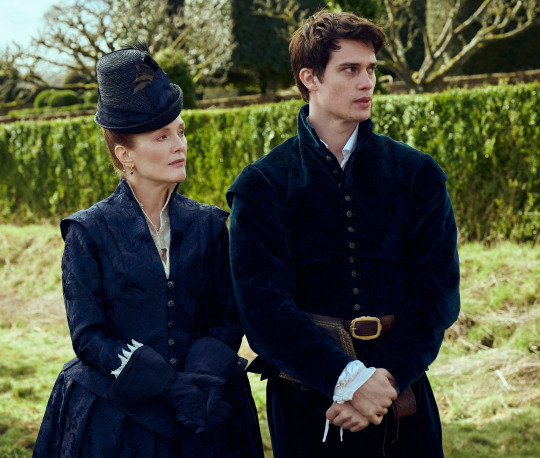

Upcoming Sky Atlantic/AMC TV Limited Series 'Mary & George' adaptation
by Creator D.C. Moore.
#this is going to be so fiyah--its told from villiers' mum pov i think and how she trained her son to seduce the english king#nicholas galitzine#red white and royal blue#firstprince#mary and george#mary & george#amc mary and george#tony curran#julianne moore#laurie davidson#george villiers#mary villiers#king james i#queer history#lgbt#queer#queer media#period drama#the king's assassin#benjamin woolley#rwarb#rwrb movie#rwrb book#rwarb movie#king james version#king james bible#historical fiction#17th century#duke of buckingham
586 notes
·
View notes
Text


Love is... stored in the translation... 😌💖
#warhammer 40k#the twice dead king#oltyx#zultanekh#necrons#necron#translation#korean translation was done by me and colour-coded to show who's speaking#i tell you what zultanekh's speech patterns are Even More Of A Thing in korean. dude switches between like 3 formal registers#props to korean fans of warhams btw. gw does not officially export there nor provide official translations of anything#(all imports into korea are done by third parties with original english intact)#the information-heavy aspect of the korean fandom runs almost entirely on multilinguals who happen to own this stuff#and can provide summaries of novels/codexes/community postings or help translate excerpts#as much as james workshop's practices make me sad i do hope they reach out to a korean market one day#if for no other reason than i really really really want people to purchase all the necron novels!!! aaaaa!!! 🤪
20 notes
·
View notes
Text
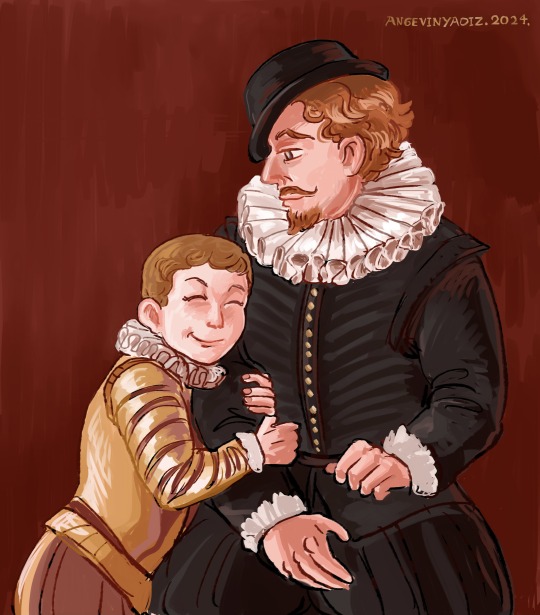
The Cradle King and his Favorite
(James VI & I and Esme Stuart)
#king james vi and i#king james i#esme Stuart#16th century#1500s#english history#scottish history#the stuarts#my art#not medieval
12 notes
·
View notes
Text

I always thought that Nicholas Galitzine was an underrated actor and I'm so happy and excited that he's gained more attention and popularity since the last year... I'm so proud of him...
Also, I don't care how many times he's played a royal or a noble character , it's never enough for me... I can't really explain it but it seems like he was born to play that genre of characters? and for your information, I'm very picky when it comes to the actors and actresses playing historical figures and royals...
Nicholas Dimitri Constantine Galitzine as George Villiers in the new tv series
"Mary and George" (2023)
#thoughts#authors#film#cinema#film scene#tvandfilm#tv series#uk#tv shows#nicholas galitzine#nicholas dimitri constantine galitzine#george villiers#mary villiers#king james#king james vi#british history#english history#history#historic fiction#romance#mlm#lgbtq community#lgbt#red white and blue#prince henry fox mountchristen windsor#prince henry george edward james hanover stuart fox#prince henry rwrb#gay romance#british actors#rwrb movie
25 notes
·
View notes
Text
I had a dream where I saw a ghostly English Civil Wars pikeman, like this sketch I drew on my phone. His face was in shadow except for his eyes.

(Don't worry, the only thing haunting me is the Spectre of Executive Dysfunction, as I avoid working on a big project by looking at English Civil War uniforms before bed.)
Anyway it made me speculate: what if an English Civil War soldier ghost was trying to haunt some American kids, but they kept thinking he was a conquistador because of the morion helmet? Imagine being a New Model Army puritan and now people are trying to exorcise you with Roman Catholic priests!
"GOD'S WOUNDS! I be an Engliſhman!!"
"Aaaaaaa!! What did he just say?! Was that Spanish?? Uhh... vete, espiritu maligno!"
#truly eternal torment#could be some kind of blood oath situation where you have to haunt your descendants#i would love and cherish the english civil war ghost haunting me#even when he criticizes my king james bible translation#shaun talks
28 notes
·
View notes
Text
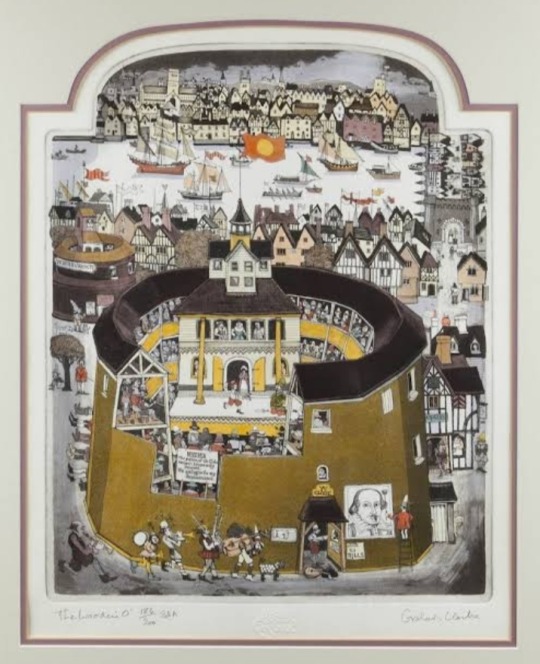
Shakespeare's Globe Theatre.
The story of Globe Theatre started with William Shakespeare's acting company, Lord Chamberlain's Men.
William Shakespeare (baptized 26 April 1564 – 23 April 1616) was a part-owner or sharer in the company, as well as an actor and resident playwright.
From its inception in 1594 AD, Lord Chamberlain's Men performed at Theatre, a playhouse located in Shoreditch.
However, by 1598, their patrons, including Earl of Southampton, had fallen out of favour with the Queen.
Theatre's landlord, Giles Alleyn, had intentions to cancel the company's lease and tear the building down.
While Alleyn did own the land, he did not own the materials with which the theatre had been built.
So, on 28 December 1598, after leasing a new site in Southwark, Cuthbert and Richard Burbage led the rest of the company of actors, sharers, and volunteers in taking the building down, timber by timber, loading it on to barges, and making their way across Thames.
Working together, the actors built the new theatre as quickly as they could.
The ground on the new site was marshy and prone to flooding, but foundations were built by digging trenches, filling them with limestone, constructing brick walls above stone, and then raising wooden beams on top of that.
A funnel caught rainwater and drained it into ditch surrounding the theatre and down into Thames.
The theatre was 30m in diameter and had 20 sides, giving it its perceived circular shape.
Structure was similar to that of their old theatre, as well as that of the neighbouring bear garden.
The rectangular stage, at 5ft high, projected halfway into the yard and circular galleries.
Pillars were painted to look like Italian marble, sky painted midnight blue, and images of gods overlooked balcony. It could hold up to 3,000 people.
By May 1599, the new theatre was ready to be opened.
Burbage named it Globe after the figure of Hercules carrying the globe on his back — for in like manner, the actors carried Globe's framework on their backs across Thames.
A flag of Hercules with globe was raised above theatre with Latin motto: 'totus mundus agit histrionem' ('all the world's a playhouse').
Shakespeare's plays that were performed there early on included:
Henry V, Julius Caesar, As You Like It, Hamlet, Measure for Measure, Othello, King Lear, Macbeth, and Antony and Cleopatra.
Here, the Lord Chamberlain's Men enjoyed much success and gained the patronage of King James I in 1603, subsequently becoming The King's Men.
During a fateful performance of Henry VIII on 29 June 1613, a cannon announcing the unexpected arrival of the king at the end of Act 1 set fire to the thatched roof, and within an hour, the Globe burned to ground.
Everyone escaped safely, save for one man whose breeches reportedly caught fire. Two different songs had been written about it by the next day.
Globe was rebuilt by February 1614. The company could then afford to decorate it extravagantly, and it had a tiled roof instead of thatched.
However, by this point, Shakespeare's influence had lessened. He was spending more and more time back in Stratford-upon-Avon.
Disaster struck again in 1642 when the Parliament ordered the closure of London theatres.
In 1644-45, Globe was destroyed and the land sold for building.
In 1970, American actor and director, Samuel Wanamaker CBE (born Wattenmacker; 14 June 1919 – 18 December 1993), set up the Shakespeare's Globe Trust to pursue his dream of reconstructing the original Globe Theatre.
For what would be almost the next 30 years, he and his team worked and fought to obtain the permissions, funds, and research necessary for a project of this scope.
Historians, scholars and architects all worked together in their efforts to build the Globe in the same way Lord Chamberlain's Men did, down to the green oak pillars and thatched roof.
Their work and dreams were fulfilled when the new Globe Theatre opened in 1997, one street away from where original stood.
Globe stands today as a living monument to Shakespeare, greatest English playwright, home to productions of his plays and many other new ones every season.
#William Shakespeare#Globe Theatre#Elizabethan Age#Jacobean Age#British theatre#English Renaissance#Early Modern Period#actor#playwright#writer#Lord Chamberlain's Men#Queen Elizabeth I#Giles Alleyn#1500s#16th century#King James I#The King's Men#1600s#17th century#Samuel Wanamaker#Shakespeare's Globe Trust#theatres#plays
6 notes
·
View notes
Text
Being an interfan of east / southeast asian entertainment contains you having to learn all kinds of accents of asian languages when your favs learn to speak english. You even have to fill the gaps sometimes when they struggle to find the english words.
#James accent is a bit challenging sometimes but I love that he's trying#also Taemin certified english king
2 notes
·
View notes
Text
im getting kinda sick and tired of having to tell people im Not christian so i Don’t celebrate christmas. even the safe spaces/communities im active in frequently have people say things like “merry christmas everyone!” and like… do you consider me not a person then? because fuck you yes i am.
only two of my non-jewish friends bothered to wish me a happy chanukah — i had to remind the rest that im jewish when they wished me a happy fake anniversary of the rebirth of a god i do not pray to. imho even “happy holidays” is better than “merry christmas” because it excludes a lot less people, but it still leaves a bad taste as someone who in many ways is not the way USA-ers are expected to be.
ive never celebrated christmas so i don’t know if there’s a special feeling that comes from wishing someone a merry christmas, but im not saying to never say that to people. go ahead and say that to anyone you know celebrates.. but maybe just don’t assume everyone celebrates something, and especially don’t assume everyone celebrates christmas.
#me#me rn#ramblings#vent#venting#jewish#judaism#i don’t celebrate christmas#tell me more about how that’s strange please#i would love to hear you elaborate on why you think im missing out on all the ’holiday fun’#as if i don’t have great experiences with jewish holidays that you might never even have heard of#meanwhile if i want to feel the ‘magic’ of your fancy dancy christmas i can watch literally any hallmark movie#one part of this that really gets to me sometimes is that christianity couldn’t exist without judaism and yet they still want to point out#how weird jews and our holidays are… when technically you should be doing all of that shit too#especially if you believe in your old testament#which by the way is a bastardized hateful version of the torah translated through several languages to get from hebrew to english#so you can imagine how many things have been misrepresented in translations like the king james#even in the original hebrew Each Sentence can be translated multiple different ways from hebrew to english - and if the study is being led#by a good teacher then you’ll go through each of those potential meanings and talk about how likely they are and what specifically they mean#anyways.#jewish anger#indignation#yknow#and please please please don’t start coming at me for saying this stuff. i realize im emotional and not thinking as clearly as possible but#this is just me blowing off steam. im not trying to actually tell people what to do and believe#religion cw#religion tw#christianity cw
8 notes
·
View notes
Text

King James II of England when he was Duke of York by English painter John Michael Wright.
He was the spare who became king since his eldest brother Charles didn’t have any legitimate children (but had tons of illegitimate children), but was kicked off the throne by his daughter Mary and son-in-law/nephew William for his Catholicism and not reading his subjects’ minds.
#i must say james was quite good looking during this period#too bad he was like his brother when it came to bedroom pleasures#king james ii#stuarts#english royalty#17th century art
13 notes
·
View notes
Text
im not sure if this is a hot take but i dont love the tma ending. i hate how none of the other characters will hear jon out, how none of them agree that ending the world is the right thing, the merciful thing to do. i understand martin, georgie and to an extent melanie- but basira? who just had to kill her partner bc daisy had turned into something monstrous? it makes sense that martin doesnt bc of his love for jon, but after experiencing sasha’s fate, the unknowing, jane pretiss, and so many other horrors it baffles me that he wouldnt even humor the idea, though ultimately i do agree that that is in line with his character. also like- every single one of the characters had been personally stripped of their agency in one way or another every. single. one. the whole world has been. it does not make sense to me that jon is the only one who thinks ending the world fast, as mercifully as he can, is the only way. no one should have that kind of power, but he does. he does and he is fighting against the web. jon has been hated by these characters, always validly but sometimes to an extent that it was not fair (if that makes any sense). jon has just found out that is whole life has been planned, that no matter what he does it would have always ended like this- obviously his own worse qualities played a part in that, but still. of course jon, who will do whatever to prevent people from getting hurt even if it is horrible and stupid, would think the world dying is the best case scenario. he does not want anyone to go through what he did, what they all did. also i think narratively the world dying makes more sense? the horror comes from the fact no one really has a choice, either you are in the wrong place at the wrong time or you have been marked by a power that you cannot fathom. and it ends with the characters just accepting that and following what the web wants, giving up their last bit of agency just to be free from the pain. i understand that that is the tragedy, that they are now free but at what cost. to me it is just more compelling that the universe is free at the cost of everything the characters know, everything they love, everything on earth.
#tma#tma s5#tma spoilers#jon sims#i just have a lot of feelings#i do like the ending#but#i am argumentative#and have an english degree#therefore i must over analyze everything#and have strong opinions#martin blackwood#melanie king#basira hussain#tim stoker#sasha james#daisy tonner#georgie barker
4 notes
·
View notes
Text
Anyway I do think James Norrington is a Tory (archaic) based on very good evidence:
A) he's a young man in the 1720s called James which I think is irrefutable proof and
B) his whole personality
#look if james norrington doesnt scream 'english kings for england!!!' i dont know what dors#*does#also Heavy catholic energy on this one#(i know Not All tories were catholics etc but here yes)#anyway anyway i do want him to have a weird kinda penpal friendship with james oglethorpe#oh look another post for just me#my house etc
17 notes
·
View notes
Text

King James VI and I was a both a Gay and Christian icon!
🏴🏳️🌈
👑🏴
🇨🇮🏳️🌈
#history#king james vi & i#england#scotland#ireland#king james bible#christianity#king#lgbtq#gay#pride#english history#scotish history#historical figures#lgbtq history#lgbtq positivity#gay love#christian#monarchy#pride month#gay christian#lgbtq icons#gay pride#king of england#roman catholic#presbyterian#anglican church#gay history#nickys facts
15 notes
·
View notes
Text
Early Modern English: Shakespearean Era to the King James Bible (1500-1700 AD)
Early Modern English is the linguistic epoch that spans roughly from the late 15th century to the late 17th century. It represents a significant transitional phase in the evolution of the English language, bridging the gap between the Middle English period and the modern form of the language that we use today.
During the Early Modern English period, several key developments profoundly influenced…
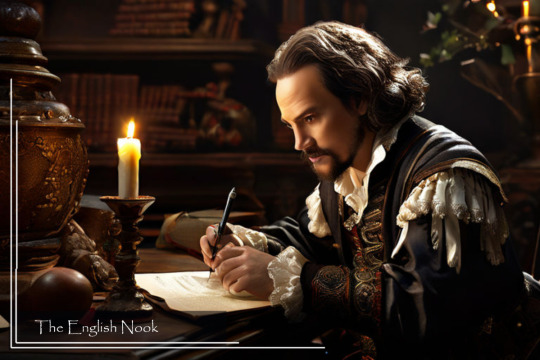
View On WordPress
#Cultural exchange in language#Early Modern English history#education#English#English language evolution#English vocabulary enrichment#english-language#english-learning#Exploration and language evolution#Grammar changes in Early Modern English#inglés#King James Bible influence#King James Version impact#language#Language during Renaissance#language-learning#languages#learn-english#learning#Linguistic developments 1500-1700#Printing press influence#Renaissance language transition#Shakespearean era language#Standardization of English#William Shakespeare vocabulary
0 notes
Text
The King James Bible
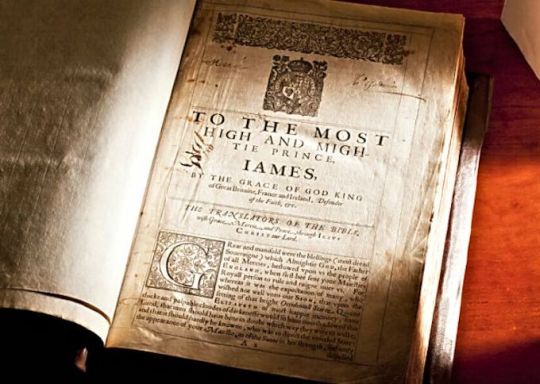
The King James Bible
A feast is made for laughter, and wine maketh merry: but money answereth all things.
King James Bible
Ecclesiastes 10:19
All things are full of labour; man cannot utter it: the eye is not satisfied with seeing, nor the ear filled with hearing.
King James Bible
Ecclesiastes 1:8
The thing that hath been, it is that which shall be; and that which is done is that which shall be done: and there is no new thing under the sun.
King James Bible
Ecclesiastes 1:9
And I saw the dead, small and great, stand before God; and the books were opened: and another book was opened, which is the book of life: and the dead were judged out of those things which were written in the books, according to their works.
King James Bible
Revelation 20:12
And when he had spoken these things, while they beheld, he was taken up; and a cloud received him out of their sight.
King James Bible
Acts 1:9
I am not worthy of the least of all the mercies, and of all the truth, which thou hast shewed unto thy servant; for with my staff I passed over this Jordan; and now I am become two bands.
King James Bible
Genesis 32:10
A great influence on the English language occurred in 1611, five years before Shakespeare died. This was the publication of the King James's translation of the Holy Bible, a 14th-century translation by John Wycliffe, The King James Version, as it is called, was completed in 1611.
If Shakespeare gave the language its greatest poetry, the Bible gave it much of its greatest prose. This version of the Bible was not written by one man but by a team or committee of some 47 scholars. We know very little about them except that they were certainly men of literary genius, and we have their finished work as a proof.
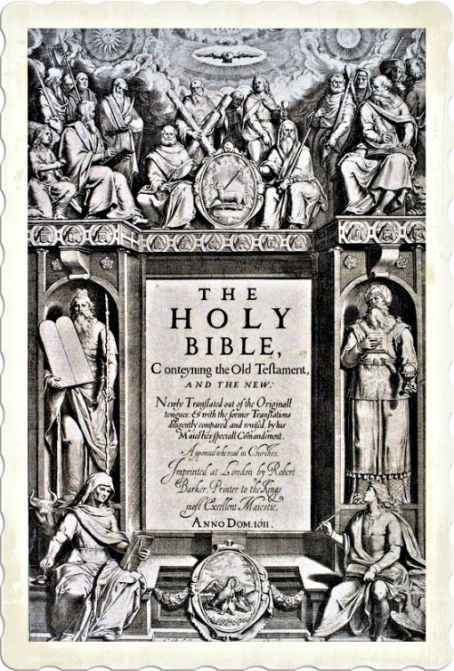
King James Bible
The followers of John Wycliffe undertook the first complete English translations of the Christian scriptures in the 14th century. These translations were banned in 1409 due to their association with the Lollards. The Wycliffe Bible pre-dated the printing press but it was circulated very widely in manuscript form, often inscribed with a date which was earlier than 1409 in order to avoid the legal ban.
Because the text of the various versions of the Wycliffe Bible was translated from the Latin Vulgate, and because it also contained no heterodox readings, the ecclesiastical authorities had no practical way to distinguish the banned version; consequently, many Catholic commentators of the 15th and 16th centuries (such as Thomas More) took these manuscripts of English Bibles and claimed that they represented an anonymous earlier orthodox translation.
In 1525, William Tyndale, an English contemporary of Martin Luther, undertook a translation of the New Testament. Tyndale's translation was the first printed Bible in English. Over the next ten years, Tyndale revised his New Testament in the light of rapidly advancing biblical scholarship, and embarked on a translation of the Old Testament.
Despite some controversial translation choices, and in spite of Tyndale's execution on charges of heresy for having made the translated Bible, the merits of Tyndale's work and prose style made his translation the ultimate basis for all subsequent renditions into Early Modern English.
Under the leadership of John Calvin, Geneva became the chief international centre of Reformed Protestantism and Latin biblical scholarship. The English expatriates undertook a translation that became known as the Geneva Bible. This translation, dated to 1560, was a revision of Tyndale's Bible and the Great Bible on the basis of the original languages.
Soon after Elizabeth I took the throne in 1558, the flaws of both the Great Bible and the Geneva Bible (namely, that the Geneva Bible did not "conform to the ecclesiology and reflect the episcopal structure of the Church of England and its beliefs about an ordained clergy") became painfully apparent. In 1568, the Church of England responded with the Bishops' Bible, a revision of the Great Bible in the light of the Geneva version.
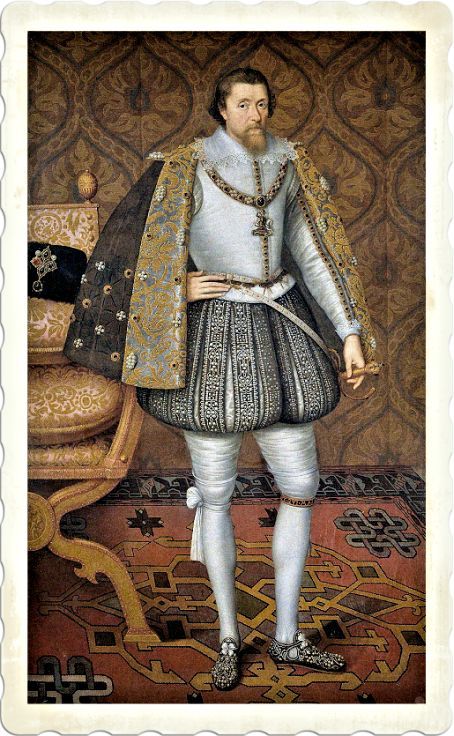
King James I
While officially approved, this new version failed to displace the Geneva translation as the most popular English Bible of the age - in part because the full Bible was only printed in lectern editions of prodigious size and at a cost of several pounds. Accordingly, Elizabethan lay people overwhelmingly read the Bible in the Geneva Version - small editions were available at a relatively low cost. At the same time, there was a substantial clandestine importation of the rival Douay–Rheims New Testament of 1582, undertaken by exiled Roman Catholics. This translation, though still derived from Tyndale, claimed to represent the text of the Latin Vulgate.
In May 1601, King James VI of Scotland attended the General Assembly of the Church of Scotland at St Columba's Church in Burntisland, Fife, at which proposals were put forward for a new translation of the Bible into English. Two years later, he ascended to the throne of England as James I. In January 1604, King James convened the Hampton Court Conference, where a new English version was conceived in response to the problems of the earlier translations perceived by the Puritans, a faction of the Church of England.
James gave the translators instructions intended to ensure that the new version would conform to the ecclesiology - and reflect the episcopal structure - of the Church of England and its belief in an ordained clergy. The translation was done by 6 panels of translators (47 men in all, most of whom were leading biblical scholars in England) who had the work divided up between them: the Old Testament was entrusted to three panels, the New Testament to two, and the Apocrypha to one.
In common with most other translations of the period, the New Testament was translated from Greek, the Old Testament from Hebrew and Aramaic, and the Apocrypha from Greek and Latin. In the Book of Common Prayer (1662), the text of the Authorized Version replaced the text of the Great Bible for Epistle and Gospel readings (but not for the Psalter, which substantially retained Coverdale's Great Bible version), and as such was authorized by Act of Parliament.
By the first half of the 18th century, the Authorized Version had become effectively unchallenged as the English translation used in Anglican and English Protestant churches, except for the Psalms and some short passages in the Book of Common Prayer of the Church of England. Over the course of the 18th century, the Authorized Version supplanted the Latin Vulgate as the standard version of scripture for English-speaking scholars.
With the development of stereotype printing at the beginning of the 19th century, this version of the Bible became the most widely printed book in history, almost all such printings presenting the standard text of 1769 extensively re-edited by Benjamin Blayney at Oxford, and nearly always omitting the books of the Apocrypha. Today the unqualified title "King James Version" usually indicates this Oxford standard text.
The outstanding prose works of the Renaissance are not so numerous as those of later ages, but the great translation of the Bible, called the King James Bible, or Authorized Version, published in 1611, is significant because it was the culmination of two centuries of effort to produce the best English translation of the original texts, and also because its vocabulary, imagery, and rhythms have influenced writers of English in all lands ever since. Similarly sonorous and stately is the prose of Sir Thomas Browne, the physician and semiscientific investigator. His reduction of worldly phenomena to symbols of mystical truth is best seen in Religio Medici (Religion of a Doctor), probably written in 1635.
It is impossible to estimate the importance or effect of the King James Bible on the English language. Listen to the simplicity but the power of the prose in these lines from St Paul's first epistle to the Corinthians: When I was a child, I spoke as a child, I understood as a child, I thought as a child: but when I became a man, I put away childish things. For now we see through a glass, darkly; but then face to face. now I know in part; but then shall I know even as also I am known. And now abideth faith, hope, charity, these three; but the greatest of these is charity.
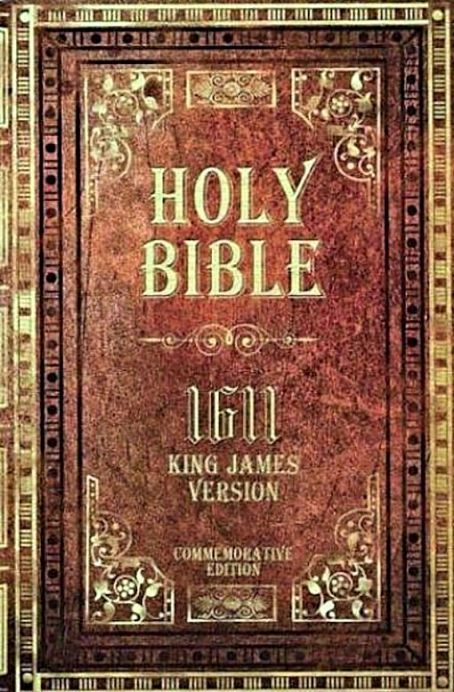
King James Holy Bible
What we call "modern English" comes from the period immediately following the publication of the Bible and Shakespeare's death. We generally consider 1640 to be the beginning of modern English, and the language has changed remarkably little ever since. By the 17th century the language had discarded its grammatical complexities: no more declensions and a minimum use of the subjunctive. Grammatical gender had disappeared and English became the only European language to employ natural gender that is using feminine pronouns for things feminine, masculine pronouns for things masculine and the neuter "it" for everything else. How much simpler than in, say, German where a table is "he", a postage stamp is "she" and a girl is "it".
Then too, English gave up its second person singular - what on the Continent is known as "the familiar form" expressed by to in Italian. Spanish and French and du in German. In English this was "thou" and its use became restricted to poetry, church and a few provincial dialects. Instead, English, as you well know, now simply uses the plural form "you" for everyone and for all. In place of the grammatical complexities of Old English, the language became more exact in other ways. Modern English has a fixed system of word order more exact than exists in any other language and a highly sophisticated use of tenses which causes so much difficulty for a foreign student.
So the King James Bible, also known as the Authorized Version, has had a profound influence on the English language since its publication in 1611 and certainly played a significant role in standardizing the English language. In fact its translators sought to create a version that would be accessible and understandable to all English speakers, regardless of their social status or region. This helped to establish a uniform form of English across different communities.
What's more it contributed to a great vocabulary enrichment since the translators of the King James Bible used rich and eloquent language, drawing heavily from the literary traditions of the time. They introduced many words and phrases into the English language that have since become commonplace, including "eye for an eye," "the salt of the earth," "scapegoat," "fly in the ointment," and "out of the mouth of babes." Furthermore The King James Bible popularized certain phrasal patterns and idiomatic expressions that are still in use today. Its language has permeated various aspects of English-speaking culture, including literature, politics, and everyday speech.
The King James Bible has also had a profound impact on the moral and ethical values of English-speaking societies. Its teachings and narratives have shaped the cultural and religious landscape of the English-speaking world, influencing everything from laws and social norms to literature and art. Therefore the King James Bible's influence on the English language is vast and enduring, and its legacy continues to be felt in both religious and secular contexts to this day.
For example the King James Bible has influenced numerous English writers and poets over the centuries, including William Shakespeare, John Milton, John Bunyan, and John Donne. Its majestic language and poetic style have left an indelible mark on English literature. Many famous literary authors have been influenced by the Bible, as its stories, themes, and language have permeated Western culture for centuries.
Here are some notable authors whose works show significant influence from the Bible. First we can quote John Milton, whose epic poem "Paradise Lost" draws heavily on biblical themes, particularly those found in the book of Genesis. The poem explores the Fall of Man, the rebellion of Lucifer, and other biblical narratives. Or Shakespeare's works that are filled with biblical allusions and imagery. Many of his plays, such as "Hamlet," "Macbeth," and "King Lear," contain references to biblical stories and characters.
But how not to mention John Bunyan, the author of "The Pilgrim's Progress," who was deeply influenced by the Bible. His allegorical tale draws heavily on biblical themes and imagery to explore the Christian journey. And also Herman Melville's masterpiece, "Moby-Dick," that contains numerous biblical allusions and references. The novel explores themes of good and evil, redemption, and the search for meaning - all of which are deeply rooted in biblical tradition.
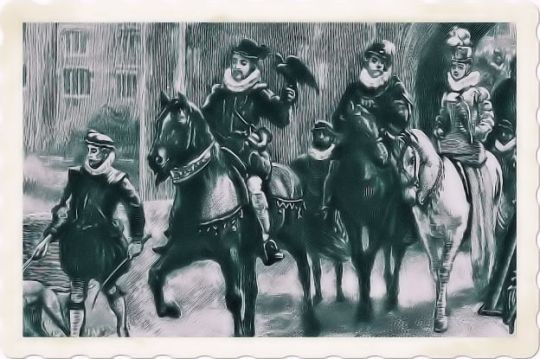
King James I of England and Scotland
Even poets such as Emily Dickinson whose poetry often reflects her deep engagement with the Bible. Many of her poems explore religious themes, and she frequently incorporates biblical imagery and language into her work. Then there is T.S. Eliot, a renowned modernist poet, who drew extensively on the Bible in his poetry. His famous work "The Waste Land" contains numerous biblical references and allusions, reflecting his interest in Christian theology and symbolism.
But also Charles Dickens, Elizabeth Barrett Browning, George Eliot, and Thomas Carlyle were influenced by the Bible. Last but not least we can remember Fyodor Dostoevsky. Dostoevsky, though not writing in English, was influenced by the Bible in his Russian novels. His exploration of moral and existential themes in works like "Crime and Punishment" and "The Brothers Karamazov" resonates with biblical ideas of sin, redemption, and the human condition.
Dubliners is a collection of fifteen short stories by James Joyce, and the book contains a story with this title “A Little Cloud” that alludes to a Biblical passage, I Kings 18:44: “And it came to pass at the seventh time, that he said, Behold, there ariseth a little cloud out of the sea, like a man's hand. And he said, Go up, say unto Ahab, Prepare thy chariot, and get thee down that the rain stop thee not.” The little cloud is the harbinger of a great rain, which the prophet Elijah summons to end a drought.
The title "A Little Cloud" may also evoke the biblical phrase from the book of Job, where God speaks to Job out of the whirlwind, saying: "Hast thou entered into the treasures of the snow? or hast thou seen the treasures of the hail, which I have reserved against the time of trouble, against the day of battle and war?" (Job 38:22-23, King James Version). This passage refers to the idea of small clouds holding great potential, possibly reflecting the protagonist's aspirations and dreams in the story.
As a matter of fact in "A Little Cloud," the protagonist, Little Chandler, dreams of becoming a successful writer like his friend Gallaher, who has achieved fame abroad. However, his dreams clash with the realities of his mundane life in Dublin, where he is trapped in a dull job and responsibilities of family life. The story explores themes of disillusionment, longing for escape, and the tension between dreams and reality.
The biblical allusion could be interpreted as suggesting that even small aspirations or desires, represented by "a little cloud," can carry significant weight and have profound implications for individuals, especially when they collide with the harsh realities of life, akin to the "time of trouble" mentioned in the biblical passage.
To conclude this article we must consider that the Bible is one of the most widely printed and distributed books in history. Millions upon millions of copies of the Bible have been printed in numerous languages and editions over the centuries. It has been translated into thousands of languages and dialects, making it accessible to people all around the world. The Bible has had a profound impact on countless individuals across diverse cultures and time periods.
You can also visit these pages:
www.kingjamesbibleonline.org
www.biblestudytools.com
Origins of proverbs
Wisdom of proverbs
Quotes by authors
Quotes by arguments
Thoughts and reflections
Essays with quotes
Read the full article
#1611#Aramaic#Bible#church#cloud#common#Dubliners#Early#England#English#Genesis#Greek#Hebrew#james#John#Joyce#king#literature#Milton#modern#New#Old#Oxford#poetic#prayer#prose#Puritans#scholars#Shakespeare#style
0 notes